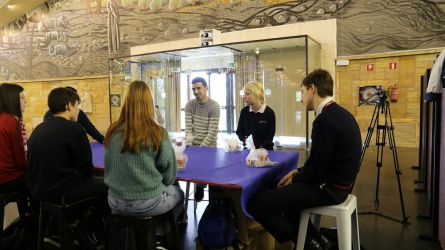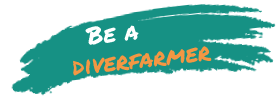Pupils from schools in the province of Cordoba hear about the Diverfarming project first hand in the activity ‘Coffee with Science’
In a breakfast shared with research staff from the University of Cordoba, the pupils of 4th ESO from schools in Lucena, Posadas, Pedro Abad and from the city of Cordoba could learn about the challenges that the European Diverfarming project poses, from the researcher Manuel González, of the Departamento de Edafología at the University of Cordoba.
 The activity ‘Coffee with Science’, organised by the Unidad de Cultura Científica y de la Innovación within the Science Week, is held on an informative basis in which science finds its way into the breakfast habit. In a different breakfast, the pupils share an hour of conversation with a researcher who not only talks to them about his/her present research but also about his/her career, bearing in mind that those receiving the message are at a critical stage in which they are to choose their future profession.
The activity ‘Coffee with Science’, organised by the Unidad de Cultura Científica y de la Innovación within the Science Week, is held on an informative basis in which science finds its way into the breakfast habit. In a different breakfast, the pupils share an hour of conversation with a researcher who not only talks to them about his/her present research but also about his/her career, bearing in mind that those receiving the message are at a critical stage in which they are to choose their future profession.
Crop diversification was the leading topic at one of the breakfast tables in the latest edition of ‘Coffee with Science’. The Diverfarming project, financed by the European Commission’s Horizon 2020 programme, proposes crop diversification as a solution to the high ratio of erosion suffered by soils as a result of certain farming practices. In addition to presenting this type of management as a weapon to fight climate change, greenhouse gas emissions or against the loss in biodiversity, crop diversification also becomes an ally for the rural zones. The benefits that are obtained by increasing the soil’s productivity and the combination of several harvests are basic factors to ensure that the sector is stimulated and that the rural zones manage to stop depopulation, thus anchoring the young people to their land thanks to the creation of jobs that involve more sustainable agriculture.
In this way, bringing the project’s aims to the province’s youngsters is a first step forward to changing the agricultural system of the zone and joins the change in paradigm that the project proposes to European agriculture.
Diverfarming is a project financed by the Horizon 2020 Programme of the European Commission, within the challenge of “Food Security, Sustainable Agriculture and Forestry, Marine, Maritime and Inland Water Research and the Bioeconomy”, which counts on the participation of the Universities of Cartagena and Córdoba (Spain), Tuscia (Italy), Exeter and Portsmouth (United Kingdom), Wageningen (Netherlands), Trier (Germany), Pecs (Hungary) and ETH Zurich (Switzerland), the research centres Consiglio per la ricerca in agricoltura e l'analisi dell'economia agraria (Italy), the Consejo Superior de Investigaciones Científicas (Spain) and the Natural Resources Institute LUKE (Finland), the agrarian organisation ASAJA, and the companies Casalasco and Barilla (Italy), Arento, Disfrimur Logística and Industrias David (Spain), Nieuw Bromo Van Tilburg and Ekoboerdeij de Lingehof (Netherlands), Weingut Dr. Frey (Germany), Nedel-Market KFT and Gere (Hungary) and Paavolan Kotijuustola and Polven Juustola (Finland)).










